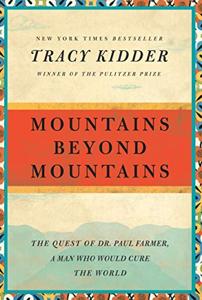
Want to learn the ideas in Mountains Beyond Mountains better than ever? Read the world’s #1 book summary of Mountains Beyond Mountains by Tracy Kidder here.
Read a brief 1-Page Summary or watch video summaries curated by our expert team. Note: this book guide is not affiliated with or endorsed by the publisher or author, and we always encourage you to purchase and read the full book.
Video Summaries of Mountains Beyond Mountains
We’ve scoured the Internet for the very best videos on Mountains Beyond Mountains, from high-quality videos summaries to interviews or commentary by Tracy Kidder.
1-Page Summary of Mountains Beyond Mountains
Overall Summary
In 1994, a journalist named Tracy Kidder travels to Haiti to report on the country’s military coup. There he sees Paul Farmer, an admired doctor and humanitarian worker, negotiate with U.S. soldiers on behalf of his Haitian patients. Five years later, Kidder sees Farmer again at Harvard Medical School where he is now a renowned doctor who treats many poor people for free in addition to paying patients. Many of his patients call him a saint because of how kind and caring he is toward them
Kidder is so impressed with Farmer that he decides to visit Haiti. He observes the work of Farmer and his nonprofit, Partners in Health, which provides free medical care for thousands of Haitians. Kidder also learns about Voodoo practices from Farmer’s research; this helps him understand why many Haitians are distrustful of Western medicine. In addition, Kidder interviews other doctors who criticize America’s military involvement with Haiti over the years.
Then, the author talks about Farmer’s early life. He was born in Massachusetts to a lower-class family and moved to Florida when he was young. There, he met Haitian immigrants while picking fruit—a task which, at that time, was regarded as “negro work.” The author goes on to talk about his excellent grades and medical school studies. The author also mentions an unusual relationship between Farmer and his father: although his father loved him very much and was proud of what he accomplished, he never gave him any praise.
As a young man, Farmer went to Haiti and met Ophelia Dahl. They became friends and he embraced the idea of liberation theology—the effort to correct humanity’s concrete problems. He used his connections with donors in Boston along with Jim Yong Kim (his Harvard friend) to build a medical facility called Zanmi Lasante in Haiti, which was run as a nonprofit organization. Farmer proposed marriage when they were in their late twenties but Ophelia turned him down for fear that it would take time away from her work at Partners In Health.
In the early 90s, there was a military junta in Haiti that banned Paul Farmer from entering the country. This inspired him to work on tuberculosis treatments and find ways to distribute them throughout South America at low costs. He later found out that drug-resistant TB was much more common than he had originally thought, which led him to partner with pharmaceutical companies and get new treatments for this disease into Peru at affordable prices.
By the late 1990s, Farmer was a very busy and famous doctor. He traveled around the world giving lectures and writing books. He also worked in Haiti and Peru on individual patients who all looked up to him as a hero. Kidder decided to follow Farmer around for a few months while he did his work in Haiti and Peru.
A man named Paul Farmer is a doctor and social entrepreneur who visits Haiti, Russia, and other places to help people. He’s married to an anthropologist named Didi Bertrand who lives in France with their small daughter. Farmer travels around the world for his work but can only stay in Paris for one day before he has to go back out on the road again. In Russia, he spoke at a conference about how prisons there are dirty and dangerous, so they need TB treatments immediately. The World Bank agrees that this project should get funding from them too.
In the year 2000, Bill Gates gave PIH (Partners In Health) 45 million dollars to eliminate tuberculosis in South America. Farmer continued to work hands-on and lecture around the world as well. While he was away from Haiti, a young boy named John developed cancer on his face. The trip alone would cost 20 thousand dollars for treatment in Boston where they have better facilities, so Serena Koenig decided to fly him there even though it was expensive. On the way there, John suffered greatly because of his facial pain and by the time he arrived in Boston he couldn’t breathe anymore. He received top notch medical care but died anyway.






